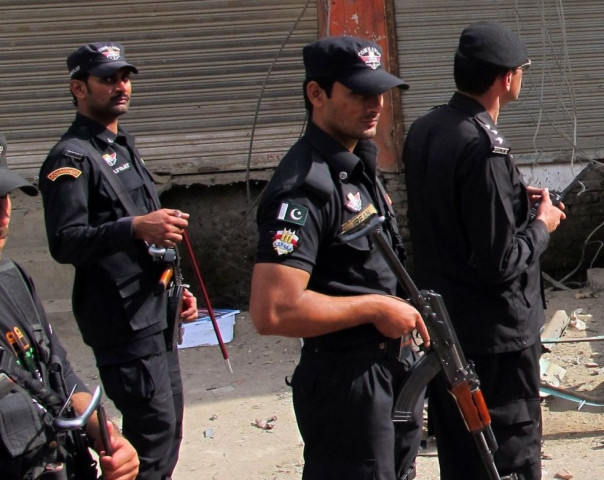Taken to task: Police book 40 principals over poor security at schools
Peshawar University hires more personnel to secure departments and hostels.

The administrator of a school said they were asked to fill a security audit form a month ago after which police paid several surprise visits. “They visit the school nearly twice every week to inspect security arrangements.” PHOTO: AFP
“We have almost completed the survey which we started in the district and have registered FIRs against principals of those schools whose security measures were found to be faulty,” a police official told The Express Tribune. The FIRs have been registered under the Protection of Sensitive and Vulnerable Establishments and Places Act 2015.
Another police official said every police station is required to maintain a register containing information about all the sensitive places in their respective jurisdictions.

“There are complete lists of sensitive places, including schools, at police stations. When the SHO thinks a place has inadequate measures, he will issue a notice to the administration asking them to beef up security,” he added. “However, if the administration fails to comply, an FIR will be registered against the principal of the institute.”
Educational institutes, he added, should have CCTV cameras, barbed wires and barriers at entry and exit points, in addition to carrying out security drills and maintaining a register of visitors.
The administrator of a school said they were asked to fill a security audit form a month ago after which police paid several surprise visits. “They visit the school nearly twice every week to inspect security arrangements.”
The administrator added their staff has also been given a software to install on their android phones, enabling them to alert the police in case of an emergency.
The principal of another school, however, said schools where most of the students come from low-income backgrounds cannot afford such security measures as the administration will have to take money from cash-strapped parents.
Precautionary measures
The administrations of institutes at the University of Peshawar (UoP) have decided to appoint 40 more security personnel. This was decided during a meeting held on Monday, said Director Media Akhtar Amin, adding the security personnel’s salaries would be paid from the university’s funds.
On January 15, a threatening poster was spotted on the boundary wall of Jinnah College for Women (JCW) at the UoP, prompting the need for special safety provisions. Security personnel wishing not to be named said the poster stated terrorists were going to target UoP in order to avenge the killing of their men.
The entire campus was gripped by panic following the threat. The administrations have therefore decided to beef up security arrangements.
Some arrangements were already put in place following the brutal attack on Army Public School last year.
“CCTV cameras worth Rs2.8 million were installed in various departments of the UoP while arms were also purchased for security guards,” said Akhtar Amin. “Besides the campus police, the university had also appointed 250 security guards who are on duty at different departments and hostels.”
He added people without hostel cards cannot enter the hostels, while students residing there have to strictly follow the timings.
He confirmed the presence of the poster on the wall of JCW, adding the culprits have been traced following a successful investigation. He did not, however, share information about the accused, saying it was a prank to stir panic among students. Amin rejected all reports regarding threats to the university, saying students should attend classes and continue their academic activities.
Published in The Express Tribune, February 10th, 2015.













COMMENTS
Comments are moderated and generally will be posted if they are on-topic and not abusive.
For more information, please see our Comments FAQ